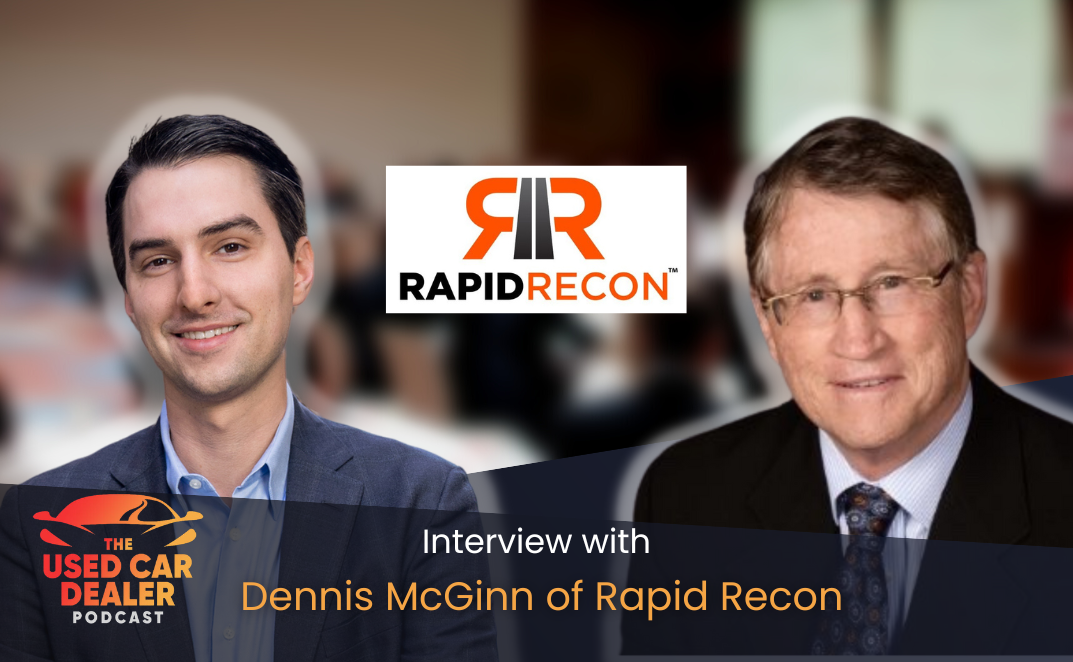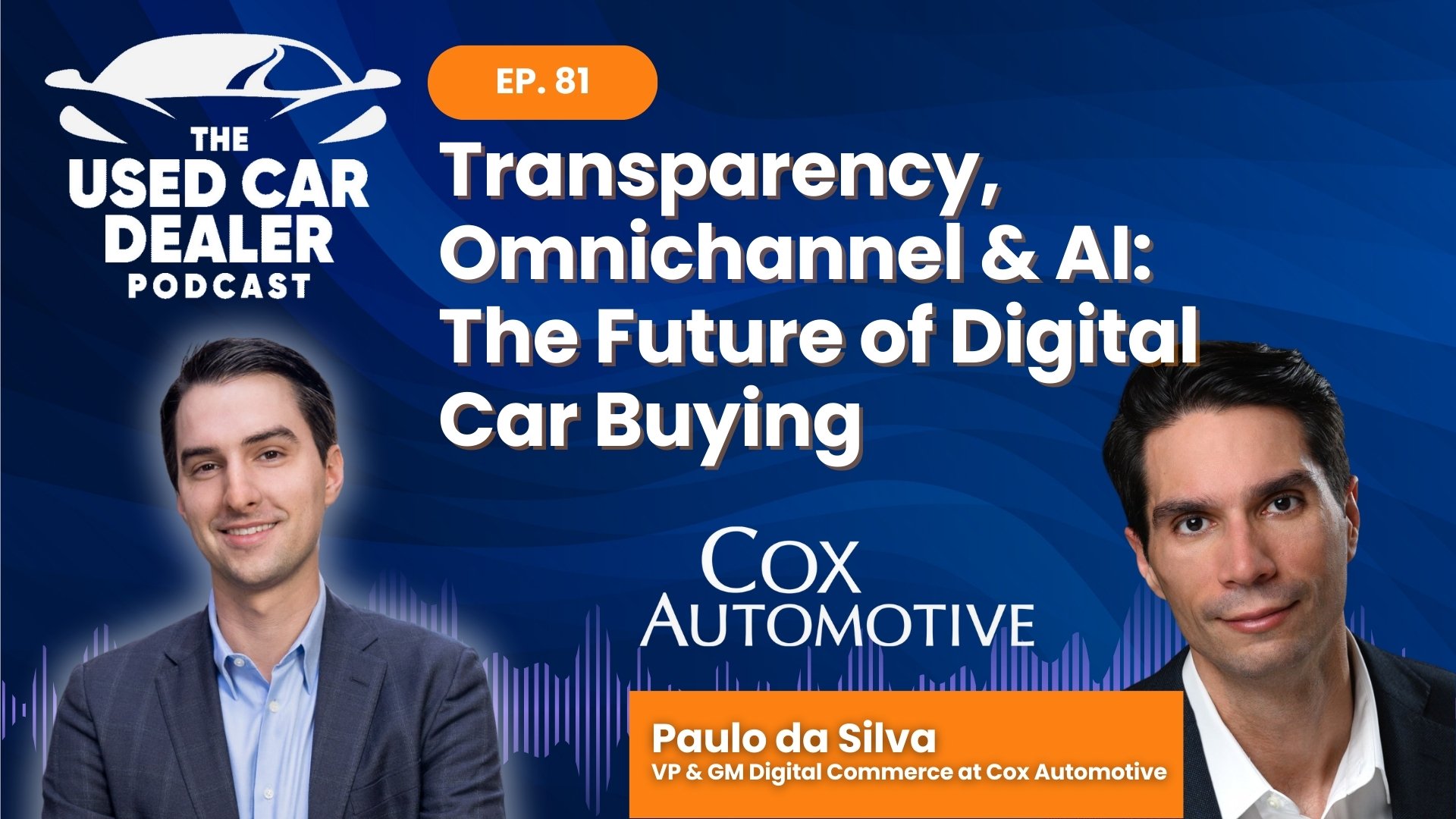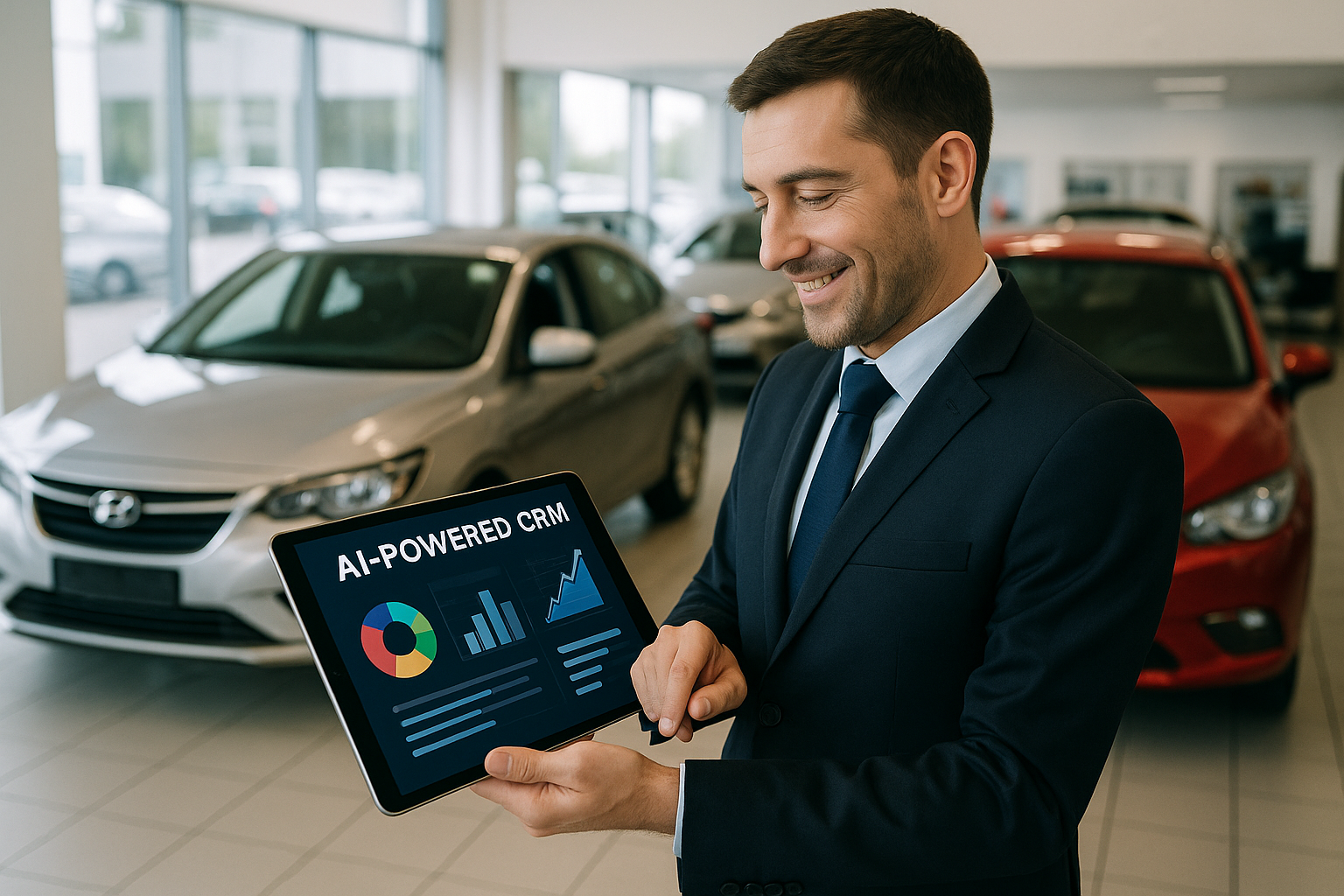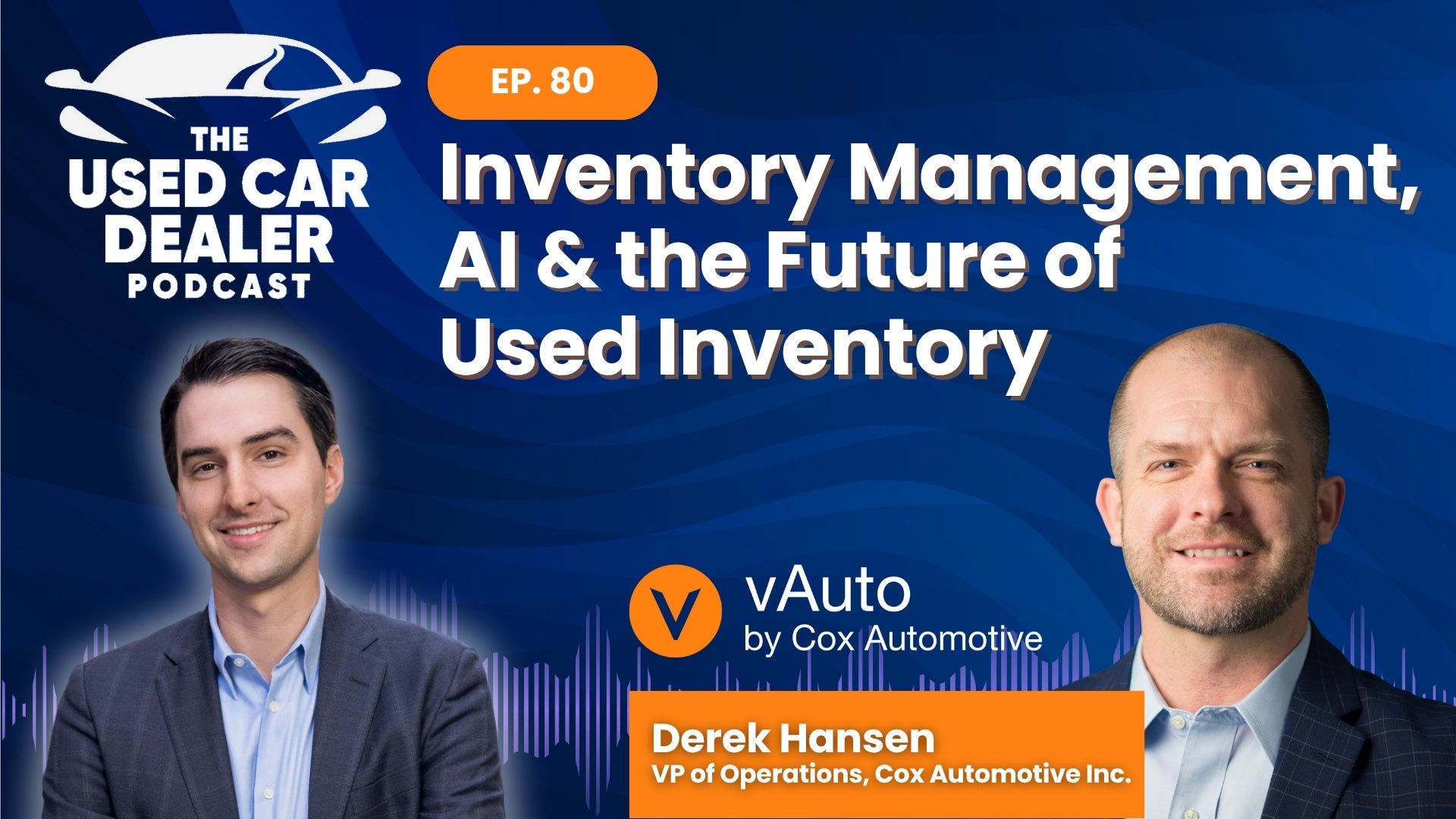In this transcribed episode of the Used Car Dealer Podcast, Zach interviews Dennis McGinn of Rapid Recon. They discuss the best practices for dealership recon, potential impact of right to repair and recall disclosure-related bills on recon management, and other related topics.
Zach: Hi, Zach here and we have another great guest on the podcast, Dennis McGinn, the founder and CEO of Rapid Recon which was recently acquired by Vallo. Dennis, thanks so much for joining me on the podcast today.
Dennis: Well, I appreciate your invitation Zach. It's really, really fun, really thrilled for me to be able to catch up with you and talk about shop.
Zach: Awesome. Well for all the dealers, all the listeners on this podcast today, talk about your background. You started to kind of as an executive in HP and then eventually started Rapid Recon. What was that story?
Dennis: Oh okay. So, you didn't start out as an executive anywhere. Right out of college, I graduated from the University of Arizona with an engineering physics and an MBA. I ended up working for Hewlett Packard when they were just getting into the computer business in Silicon Valley. I had the interesting opportunity to learn the business by doing it. I was also lucky because people like Bill Hewlett and Dave Packard are just one of a kind. It was a great company with a great culture, and I had some really good bosses there. I worked there for 21 years and got involved in the automotive industry while I was there. The president of Ford was on the board at HP, and we ended up building the Ford Service Pay Diagnostic System in my division. I had a lot of experience from the OEM side with the issues with vehicles. In that case, it was all about the additional electronics coming into the vehicles and how to get ahead of the skyrocketing failure rates because they had no diagnostic tools, and there wasn't any OBD-II or anything. The devices were still very analog. We built systems that went worldwide to help them decide whether the parts they were about ready to throw in these cars were failing or not. We also let the manufacturing guys know in places like Dearborn what was failing so they could get ahead of the curve. I got involved with BMW, Mercedes, Ford, GM Hamtramck, and all kinds of stuff, but pretty much from the OEM side.
Then I left HP after 21 years and ran a couple of other companies in different areas, all high-tech stuff. That's how I got to starting Rapid Recon. I knew a couple of people in the dealership retail business who had a problem knowing what's going on with the lot and how often cars are being opened. They were willing to put some money into it, which got me interested. We started down that track, and somebody said to me, "You know, nobody really knows how long it's taking to get these cars ready. I mean, they really don't. We can take these trades, and we go out a week later, and they're still out there waiting to be reconditioned because there's no accountability." That really got me interested because I started asking people I knew, including folks like Dale Pollock, if this was a real problem. People were going to 20 group meetings and saying it was two or three days and not bothering with it. The answer was yes; it's exactly what they're doing. Nobody wanted to give the GM bad news to take to their 20 group meetings. So they would just give them the best-case scenario, and that's all he wanted to hear. They really never had the information until it started to blow up. I helped light a match to their understanding of how long it was taking and what it was costing them. That was the genesis of Rapid Recon - getting in there, finding out that nobody really knew, they were all just kidding themselves, and it becomes self-fulfilling after a while. Everybody just used to give out good information, and you don't go back until something goes really sideways.
Zach: So Dennis, discuss what Rapid Recon does for dealers and how the product has evolved since their early days.
Dennis: Well, I mean, what we do is we have a workflow. Work starts, goes through steps, and ends up being sale-ready or sold. And there could be 10 steps or 100. When you're reconditioning a car and getting it ready for our customers' eyes and for reliability, you really have to take it through a lot of steps, including things like recalls, safety, and all those things.
So what we do is we give the people doing the work, including the vendors (they're just an extension of that, whether it's glass, bumpers, interior, whatever), the ability to manage their own accountability. Instead of having somebody else decide for them whether they're doing a good job or not, we developed an app to get started.
Now, they can see exactly what is in their bucket and how long it takes them to do it. And when they're done, they click something, and it moves to the next bucket. Nobody has to communicate or talk to anybody.
So it all kind of moves along from A to B, C. The metrics for how long it takes are right up there in front of everybody in the upper-left-hand corner of every screen.
So you kind of have these two metrics: one is average days in recon, and the other one is time to line, which is really from acquisition to the car's ready to sell.
That's the whole picture. That was a starting point, and things have moved quite a lot beyond that now.
Zach: And Dennis, one of the fantastic things I remember you telling me is that you've had former users of rapid recon become employees. Tell us about the culture you've built at Rapid Recon.
Dennis: Yeah, that's exactly right. Right from the beginning, we brought in people who had experience in reconditioning management, parts management, or service management. We knew that we needed experts to advise our customers on what to do. This has always been my approach to things - you need to have experts on board, otherwise, why would anyone listen to you? Why would they be interested in paying you for advice if you don't have the experience to back it up?
I think this is particularly true in the automotive industry, where knowledge of your retail business network is crucial. You can't just bring in people from other industries who are good at customer interactions - this is a very specific industry, and you need to be able to talk shop and be credible to these folks, whether you're talking to them on the phone or on site.
Zach: So Dennis, what has stuck with you about kind of building a first in category company and some of the initial challenges, kind of going to market, building awareness?
Dennis: Yeah, I mean, the big challenge is to get into first. Once I understood the problem, once I understood that nobody really knew the real information and it was kind of just self-fulfilling, nobody knew then I had to find the early adopters out of this thing.
I had to find the people that were mad because they knew it wasn't right and they weren't willing to let it float by just to make the first service manager or the recon manager feel like they're doing their job.
So it was those people that helped me get this thing started that said, "I know I'm not happy, I'm mad because I know it's taking too long and people are not accountable."
And so that was the entry point.
But I knew that it had to move from where it was, which was somebody going around to help the general manager get ready for a meeting, usually a 20-year meeting, and asking people, "How are you doing?" I mean, they will all give you the best case answer.
And it had to shift from that over to the individuals that are doing the work saying, "I'm done," being able to push a button on their phone and everybody gets notified, the car moves and everybody knows what's going on.
And so the only way to do that is to give the people doing the work a way to defend themselves. So there was no finger-pointing because that was the big thing was there was a lot of finger-pointing when things didn't go right. And then, there was a huge incentive for people to want to manage their own accountability.
And once they got on that and had the metrics right there in front of everybody, they all started to kind of see all like, "Okay, I'm part of that metric." And if it doesn't look good, if it's not on target with what Dennis or Rapid Recon or whatever they think it is, which was initially the five days was the initial target for this to get to, then we're not doing the job.
Zach: So Dennis, you have released several books over the past couple of years, your latest is "Strategic T2L - Connect to What You Expect," tell us about this book and some of the significant takeaways.
Dennis: Yeah, this is it. You wrote the book, and it has come a long way. It's a really good book, and it's not just because my picture is on the back. It's because of the experience, characterizations, and stories.
The book is full of real customer examples and interviews about how they are using workflow technology, accountability, metrics, and tools to continuously improve their operations. The concept of "inspect what you expect" is taken to the next level by connecting shared metrics.
Now, we've gone through a period of time when it seemed like it didn't matter how long it took or how much you had in the car, but that's kind of gone. It's the result of COVID and the fallout after that, where people were paying ridiculous amounts for cars. But I think it's come back to earth now, and the idea of margin compression and competition is definitely back.
However, it's never going to go back to the way it was with people having lots full of cars and always trying to keep everything under 60 days. I don't think anybody is looking to have heavy inventory, but instead, everyone wants to be more efficient and keep the amount of inventory down. This makes reconditioning even more important, especially the timeline of how long it takes to replace a car that was sold and get it back on the front line.
Zach: So what do you think dealers most often misunderstand about recon at their dealerships maybe common mistakes, your team observes pre implementation of Rapid Recon?
Dennis: Yeah, I mean, change is hard, and in this particular area, you've got a lot of people that think they already have the answers or that it could be done with a spreadsheet or something like that. They're not passionate about the same things I am, which is the average Asian recon time to line and how it ties all together with everything they're doing from acquisition to reconditioning, vendor work, safety, and tying all the way through. When you get to the end of that thing, and you have a GM who wants to know how long it's taking, it's important that the GM is interested in knowing and is willing to spend a little bit of time, not a lot, to ask the right questions. So that everybody up and down the line on the fixed and variable side knows that the GM knows where these numbers are coming from, and the GMs that do the best job are the ones that know what the numbers mean. Some of them just don't want to know because they don't need to, but my task is to continue to add awareness to this and bring efficiency and speed of reconditioning back to the bottom line. GMS know how to look at the parts business, the back end, the F&I, and the new car sales. They know their business units, but to a lot of them, reconditioning is still a bit of a mystery, and they like to either let somebody else worry about it or wait till something really bad happens before they get really mad and want to fix it. So that's kind of how I see it.
Zach: So kind of the inverse of that question. What are some of the best practices that you've observed over your decade plus in the recon software space?
Dennis: Yeah, the best practices are to have someone leading the charge, a recon manager or a fixed ops director, but typically a recon manager is bird-dogging the thing and stays on top of the things that need attention. Because of the dynamics in a dealership, with people coming and going, vendors changing, and different trends with the vehicles, there's always a need to do what I'm so familiar with back in the Silicon Valley deal, continuous process improvement. A lot of this stuff came out of post-World War II and Deming and a lot of the quality control things that ended up coming back into the US after '45. And the reason that we've got Intel and all the semiconductor guys, they really got good at this thing. That's the same thing here - the best practices are that the GM knows what's going on. They're not just delegating this. They can actually see these averages in recon, the time to line, and the details behind it, so they know what questions to ask. They don't have to be hands-on if they know what the numbers mean, and there is accountability for continually improving those processes because it never goes away. As soon as you think you've got it all right, something is going to need more attention.
Zach: So moving on, Dennis, what are your thoughts on the right to repair and recall disclosure related bills being discussed in Washington, in the potential impact on recon management?
Dennis: Yeah! You know, I'm not really close to that. I think that has a lot to do with consumer protection and, in terms of the rights of consumers to get their car repaired wherever they want if I read that right. To me, it's just another thing to make sure the car is reconditioned properly and expectations are that there are no outstanding recalls on it, no outstanding safety issues. In other words, the car is reconditioned properly and expectations are that I'm not going to need to take this car somewhere else right away and get it fixed because it's already been fixed. So, I can expect utility out of this thing for the foreseeable future. I think that's what it means. But, so yeah, my answer to that is that if you do your reconditioning right, that shouldn't come into play. Consumers shouldn't need to take the car somewhere else. It's something the dealers need to do right so those customers come back to them, which is what they are trying to do too.
Zach: So, we're both in the Bay Area. We see a lot of Teslas and a lot of EV vehicles. What are your thoughts on the different opportunities with recon of EV vehicles?
Dennis: Yeah, I mean even though there aren't fuel-burning engines in these things, they still need attention. You know, they still have interiors, they still have wheels, they still have a drivetrain, so to speak. They have all the basics, just a simpler configuration to work with, but you still need mechanics that are certified and qualified to work on those vehicles. They need to know what to do. And at the same time, the amount of technology that's going into these cars is just continuing to go up very quickly. These are becoming mobile entertainment centers, if you will. That just puts more things into the vehicle that are bound to go wrong, but it's changing the context. It's changing in the more luxury cars anyway, and I think now it's gonna come down.
It's almost a joke being here in the Bay Area, as you are, and just every stoplight I go to has three Teslas always. If there are ten cars, there are three Teslas. It's just like bang, bang, bang. My neighborhood here in Palo Alto probably has a higher percentage. The penetration is staggering around here. But there are a lot of other opportunities coming into the marketplace. I don't have a Tesla, but a lot of friends that do. I'm not sure that I think there's a lot of room for other brands to come into this marketplace.
I've heard things about Tesla that would make me think twice about getting one right now because I don't really have the need to commute and be able to get a special permit or drive in the fast lane. In that case, I might, but I'm really anxious to see some of the new challenging products that are starting to come into the marketplace. I think that's really important. We'd all like to see the air cleaner, so from that standpoint, I'm in. But I don't think it's going to add much complexity to the dealers. They're kind of having to either allocate or have one of the stores doing electric vehicles, like I've seen some of them do. But I think they're all, like Tesla, getting into everybody's inventory, definitely.
Zach: So my next question, if you were a used car dealer thinking about scaling your business at what point should you consider recon software?
Dennis: Yeah, even though there aren't fuel burning engines in electric cars, they still require attention. They have interiors, wheels, and a drive train. It's a simpler configuration, but certified mechanics are still needed to work on these vehicles. The amount of technology going into these cars is increasing quickly, making them mobile entertainment centers. Other brands will likely enter the market soon, especially given the need for cleaner air. This will add complexity for dealers, but it's important to keep up with the changing marketplace.
Regarding workflow tools for car sales, some franchises with 30 cars in inventory and selling 30 cars a month use software to manage the volume. However, it can still be a nightmare without a workflow tool. For group guys or GMs with 50 or more cars, having a workflow tool is a must-have. In our case, we have a champion for every system we bring on, including Rapid Recon. This person serves as a point of contact and is kept up to date on changes.
Zach: Nice and Dennis, my last question, what's coming down the pipeline for rapid recon in 2023?
Dennis: Yeah, it was very interesting to explore areas that I've previously avoided, such as customer pay and fixed ops. These areas involve repair orders, scheduling, parts, and so on, but we have partner companies like Service Lane Advisor who are already in that business. We will work with them to solve some of those problems as well.
We are currently working on it and it may take a few more months for us to come up with a starting point. I am excited because we will be able to enter a new area and we already have a solution. Although they don't all work seamlessly together, each product is strong in its own right, allowing us to cross-sell and explore new opportunities.
Our customers face these problems, so it's exciting.
Zach: Well Dennis, it's been an awesome episode. I've learned so much personally about recon, so thanks so much for joining us today.
Dennis: I appreciate your time and thank you for letting me have a minute on your show. I hope I haven't overstayed my welcome.


.png)




.jpg)
.jpg)
.jpg)
.jpg)

.png)
.png)
